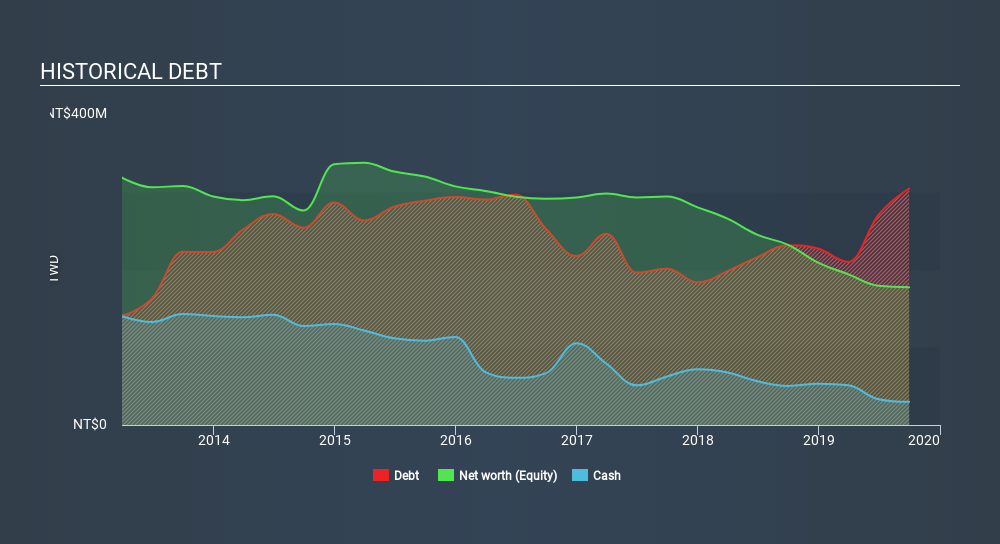- Taiwan
- /
- Electronic Equipment and Components
- /
- TPEX:8067
Gish International (GTSM:8067) Has Debt But No Earnings; Should You Worry?

Legendary fund manager Li Lu (who Charlie Munger backed) once said, 'The biggest investment risk is not the volatility of prices, but whether you will suffer a permanent loss of capital. When we think about how risky a company is, we always like to look at its use of debt, since debt overload can lead to ruin. We note that Gish International Co., Ltd (GTSM:8067) does have debt on its balance sheet. But should shareholders be worried about its use of debt?
Why Does Debt Bring Risk?
Generally speaking, debt only becomes a real problem when a company can't easily pay it off, either by raising capital or with its own cash flow. If things get really bad, the lenders can take control of the business. However, a more common (but still painful) scenario is that it has to raise new equity capital at a low price, thus permanently diluting shareholders. Of course, plenty of companies use debt to fund growth, without any negative consequences. The first step when considering a company's debt levels is to consider its cash and debt together.
Check out our latest analysis for Gish International
What Is Gish International's Net Debt?
As you can see below, at the end of September 2019, Gish International had NT$304.2m of debt, up from NT$231 a year ago. Click the image for more detail. On the flip side, it has NT$29.8m in cash leading to net debt of about NT$274.4m.

A Look At Gish International's Liabilities
According to the last reported balance sheet, Gish International had liabilities of NT$273.0m due within 12 months, and liabilities of NT$71.2m due beyond 12 months. Offsetting this, it had NT$29.8m in cash and NT$56.4m in receivables that were due within 12 months. So its liabilities total NT$257.9m more than the combination of its cash and short-term receivables.
Given this deficit is actually higher than the company's market capitalization of NT$245.0m, we think shareholders really should watch Gish International's debt levels, like a parent watching their child ride a bike for the first time. Hypothetically, extremely heavy dilution would be required if the company were forced to pay down its liabilities by raising capital at the current share price. The balance sheet is clearly the area to focus on when you are analysing debt. But you can't view debt in total isolation; since Gish International will need earnings to service that debt. So when considering debt, it's definitely worth looking at the earnings trend. Click here for an interactive snapshot.
Over 12 months, Gish International reported revenue of NT$199m, which is a gain of 58%, although it did not report any earnings before interest and tax. Shareholders probably have their fingers crossed that it can grow its way to profits.
Caveat Emptor
While we can certainly savour Gish International's tasty revenue growth, its negative earnings before interest and tax (EBIT) leaves a bitter aftertaste. Indeed, it lost a very considerable NT$46m at the EBIT level. When we look at that alongside the significant liabilities, we're not particularly confident about the company. It would need to improve its operations quickly for us to be interested in it. Not least because it burned through NT$90m in negative free cash flow over the last year. That means it's on the risky side of things. When analysing debt levels, the balance sheet is the obvious place to start. But ultimately, every company can contain risks that exist outside of the balance sheet. Take risks, for example - Gish International has 4 warning signs (and 3 which don't sit too well with us) we think you should know about.
Of course, if you're the type of investor who prefers buying stocks without the burden of debt, then don't hesitate to discover our exclusive list of net cash growth stocks, today.
If you spot an error that warrants correction, please contact the editor at editorial-team@simplywallst.com. This article by Simply Wall St is general in nature. It does not constitute a recommendation to buy or sell any stock, and does not take account of your objectives, or your financial situation. Simply Wall St has no position in the stocks mentioned.
We aim to bring you long-term focused research analysis driven by fundamental data. Note that our analysis may not factor in the latest price-sensitive company announcements or qualitative material. Thank you for reading.
About TPEX:8067
Gish International
Operates as a distribution company in Japan, Singapore, China, Hong Kong, Canada, the United States, Australia, and Chile.
Excellent balance sheet very low.
Market Insights
Community Narratives



